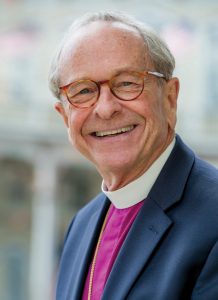According to a national survey conducted by Public Religion Research Institute and Florida State University in 2017, 31 percent of Americans are neither religious nor spiritual; 29 percent are both; 22 percent are religious but not spiritual; and 18 percent are spiritual but not religious (yet within this group, most identify with a religious tradition).

Religiosity was measured by “religious attendance and the personal importance of religion,” according to PRRI. Spirituality was measured by “self-reported experiences of being connected to something larger than oneself.”
Sixty-two percent of the nearly one-third of Americans who are neither religious nor spiritual are under age 50, as are 56 percent of the 18 percent who are spiritual but not religious.
At 9:15 a.m. Thursday, Aug. 16, at the Chautauqua Women’s Club, as part of the Chautauqua Speaks series, the Rt. Rev. V. Gene Robinson will talk about “Ol’ Time Religion: Does it work in the world anymore?”
Robinson is the senior pastor at Chautauqua Institution, as well as vice president of religion and chair of President Michael E. Hill’s Advisory Council on Faith and Society. While serving for nearly 10 years as the ninth bishop of the Episcopal Diocese of New Hampshire (from 2003 to 2013), he was the chief pastor for the clergy of about 50 congregations, nine summer chapels and three schools.
As an interfaith leader who has focused on clergy and congregations, particularly in times of conflict, Robinson has honed his skills in congregational dynamics, conflict resolution and mediation. In addition, he has written opinion columns for The Daily Beast, Huffington Post and Time, as well as two books — In the Eye of the Storm: Swept to the Center by God and God Believes in Love: Straight Talk about Gay Marriage.
About “ol’ time religion,” Robinson said: “This is a nut I think everyone in the world of religion is trying to crack, but we can all describe it, that younger generations are leaving churches in droves, and that includes … conservative Evangelicals, which for a long time were growing like crazy.”
Although Robinson said he thinks it has always been true that “young people chafe at hypocrisy when they see it,” it seems to him that in general, most young people in the present day are increasingly distrustful of institutions and organizations, and they aren’t seeing churches acting according to the values they purportedly espouse.
“I also think, starting as far back at Watergate, … our trust in organizations and institutions has been diminishing over time,” he said.
According to Robinson, the primary impetus — “by a lot” — for young people leaving conservative churches is their teachings about LGBTQ people.
“They all have LGBT friends, and they know what’s being taught about them is not true,” Robinson said.
In addition, LGBTQ church members themselves don’t like how they’re being treated.
Altogether, hypocrisy, distrust and LGBTQ discrimination have lessened the involvement of young people, leaving the future “very much more tenuous” with “the so-called ‘nones’ … very much leading the way,” Robinson said.
For the past several years, he has been a senior fellow at the Center for American Progress, which he said is one of the two largest progressive think tanks in Washington, D.C.
“What I’ve discovered there is that just because people have left their religious institution behind, they haven’t left their spiritual needs behind,” Robinson said.
Where to find these young people and how to engage them are key questions, he said.
“Jesus went where the people went,” Robinson said. “And the people pay attention to media more than they pay attention to the church. So if we cede the media to the most conservative amongst us, shame on us.”
According to Robinson, rock concerts and folk masses — which in the recent past seemed like a “wild and radical breath of fresh air” compared to “stuffy” services — aren’t the answer.
He said he wants to talk about those challenges because there’s no easy fix.
“It is a total misreading of Jesus to say that he was terribly worried about what people believe,” Robinson said. “Jesus was always talking about what we should do. … ‘Don’t tell me, show me.’ He tells the story of getting to heaven and saying, ‘Did you feed the hungry, did you clothe the naked, did you visit those in prison?’… What God cares about is what you’ve done.”
What that says to Robinson is that “younger people are drawn to communities of people and communities of faith who are active in the world doing those things.”
“And they’re not terribly interested in splitting hairs over belief and theology,” Robinson said, “but they do want to be associated with groups of people who are engaged in making the world a better place.”
What drew Robinson to the Episcopal Church was the willingness of an Episcopal chaplain at his college — the University of the South in Sewanee, Tennessee — to look with him for answers, if there were answers, to the hard questions he had been asking.
“I grew up in a fairly fundamentalist congregation of what is today a fairly liberal denomination,” Robin- son said. “By the time I was in high school, I was completely turned off by the kind of narrow approach … to God and to religion and to the world. I was asking a bunch of hard questions, and I was told there were certain questions I shouldn’t ask. Even as a 17 year (old) … I didn’t think there was any question that shouldn’t be asked.”




